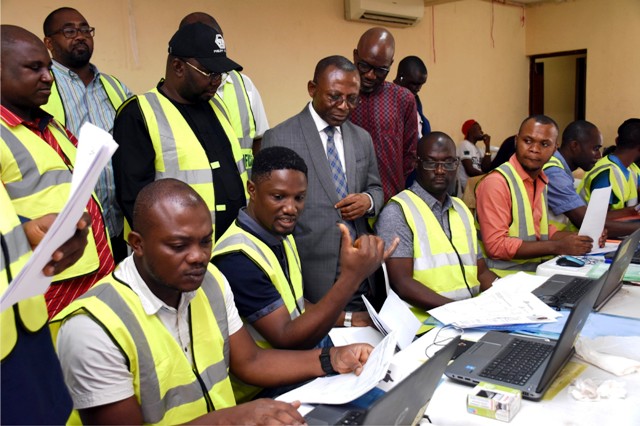Business
Host Community Gives Chevron Three Days To Meet Demands

The people of Ugborodo communities in Warri South-West Local Government Area of Delta last Monday protested over its alleged neglect by the Chevron Nigeria Limited (CNL).
The aggrieved people, who converged by the perimeter fence of Chevron office in a peaceful protest held last Monday in Ode-Ugborodo, said the multinational oil company had neglected the host communities over the years.
They gave a three-day ultimatum to Chevron to heed their demands.
Ugborodo comprised of five communities: Madangho, Ajudaigbo, Ogidigben, Ijaghala and Ode-Ugborodo.
Scores of protesters who were mostly youths held placards with inscriptions such as: “FG come to our aid”; “Chevron bring back 2002 MoU for peace to return”; “ Chevron, we need Madangho cottage hospital back in operation” among others.
Addressing newsmen, the Chairman of Ugborodo communities, Mr Austin Oborogbeyi, said over 300 metres of their land had been washed away by erosion.
Oborogbeyi who attributed the development to the operational activities of Chevron, also said the oil multinational had failed to employ or provide basic amenities for the people.
“We need proper shoreline protection, employment and basic amenities in Ugborodo. Our land is being eroded.
“More than 300m of our land to be modest has been washed away, streak of houses and electric poles have also been destroyed due to the Chevron’s operational vessels and service boats plying the Escrovos river continuously.
“The electric poles erected in year 2000 were inside the community but today they are on the sea shore. I assure you that if nothing is done in the next six months, the next poles over there will be gone.
“Chevron does not give us electricity neither does it give us water. We have made appeals severally all to no avail, They said they do not have the authority and we expected them to go where their authority is and do something.
“Chevron should protect our shore the way they did their own. They should meet the federal government for collaboration after all Federal Government has 60 per cent of whatever they are doing,” he said.
The community chairman said a letter had been mailed to Chevron headquarters in America on the development.
Also speaking, the youth president of Ugborodo, Mr Samuel Ukponu urged Federal Government to quickly intervene.
“We do not want to see Chevron, we want the Petroleum Minister and the Vice President, Prof. Yemi Osinbajo to quickly intervene.
Mrs Faith Imosen, a community woman said in local palace “na gutter water we dey drink, it use to affect our health, some people dey swell while some use to get rashes on their bodies,” she said.
Responding, Mr Esimaje Brikinn, General Manager, Policy Government and Public Affairs of Chevron said the allegations were not true.
According to him, Chevron has continued to support socio-economic development in Ugborodo communities through local community contracts, employment and scholarships.
“CNL wishes to state that the allegations are not true. In fact, Chevron has a long-standing relationship with the Ugborodo community.
“We have a reasonable number of Ugborodo community workers and contractors who have benefitted and have continued to benefit from the available employment and contract opportunities in the company.
“In addition to the provision of water and electricity to the Ugborodo community, the River Boat Clinic provides free medical services to several communities including Ugborodo community.
“ The needs in many communities, including Ugborodo community, are many and varied, requiring the support and intervention of multiple stakeholders to address.
“We are aware of this and through our GMoU governance model, we have involved other stakeholders, including the Niger Delta Development Commission, the State Government, the Ministry of Niger Delta Affairs among others.
“However, the Ugborodo community has been embroiled in leadership tussles which have hindered development in the community,” Brikinn said.
Transport
Automated Points Concession : FAAN Workers Gave 72hrs To Revise Decisions In PH

Transport
FAAN Announces Pick-Up Points for Go-Cashless Cards

Business
Fidelity Bank To Empower Women With Sustainable Entrepreneurship Skills, HAP2.0
-

 News5 days ago
News5 days agoAmend Constitution To Accommodate State Police, Tinubu Tells Senators
-

 Politics5 days ago
Politics5 days agoSenate Urges Tinubu To Sack CAC Boss
-

 News5 days ago
News5 days agoDisu Takes Over As New IGP …Declares Total War On Corruption, Impunity
-
Sports5 days ago
NDG: Rivers Coach Appeal To NDDC In Talent Discovery
-
Politics2 days ago
2027: NIGERIANS FAULT INEC ON DIGITAL MEMBERSHIP REGISTER DIRECTIVE
-

 Environment2 days ago
Environment2 days agoLAWMA Director Says Sweeping Reforms Have Improved Waste Collection
-

 Featured5 days ago
Featured5 days agoFubara Reads Riot Act To New SSG, CoS …Warns Against Unauthorized Meetings
-
Rivers5 days ago
Etche Clan Urges Govt On Chieftaincy Recognition

